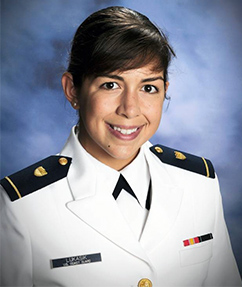Jessica Lukasik

A cadet at the U.S. Coast Guard Academy was recently granted a Fulbright Scholarship to study marine economic development in Mauritius during the 2014-2015 academic year. Cadet Jessica Lukasik, a native of Lawrenceville, Ga., and member of the Class of 2014, will pursue a master’s degree at the University of Mauritius. The Government major plans to conduct a research project and create a framework for a sustainable marine economic development model for Mauritius, an island nation in the Indian Ocean about 1,200 miles off the southeast coast of Africa.
The Fulbright Program is the flagship international educational exchange program of the United States. Cadet Lukasik will represent the country as a cultural ambassador while she is overseas, helping to enhance mutual understanding between Americans and the people of Mauritius. The 21-year old will join over 100,000 Fulbright U.S. Student Program alumni who have undertaken grants since the program began in 1948.
Lukasik’s research project will analyze available resources and space to examine interactions within the limited marine space of tourism, shipping, aquaculture, and fishing industries. She plans to focus on how the input of other industries to resource overexploitation, ecosystem degradation, and climate change affects Mauritian fisheries. The goal of the project is to propose a marine spatial planning framework that will guide the use of the maritime resources these industries require, so they can continue to provide economic development in Mauritius.
A story by1/c Jessica Lukasik:
My mother thought the world was too big to stay in one place; born in Washington, D.C. to an Armenian father and a French-Canadian mother, she had a sense of being “from everywhere” that she instilled in me. From her, I learned that an academic education is only a fraction of the learning process. Our family traveled globally and each place opened my eyes. I became aware of not just the enormous beauty of the world, but also of poverty, political turmoil, ethnic disputes, and inequalities on a local, national, and global scale. I was six years old when my parents took me off the beaten path from a cruise to Jamaica to find myself amidst cardboard shanties that Jamaican people called home. At age ten my grandpa told me stories of our family’s suffering in the Turkish genocide. I began to question my own quality of life. Powers beyond my control had blessed me with luxuries and safety when poverty and war are prevalent in other nations. It is within my power, however, to pursue a life of learning and develop skills and abilities that will help me alleviate the pain of others.
I have always been driven to compete. From my first writing contests in grade school, to the battle for first chair in orchestra, to my first triathlon, I loved tackling challenges. However, the experiences of my upbringing helped me develop compassion. Those memories had shown me that the challenges others faced were more important than my own. Driven by love for my country and an inspiration to do humanitarian work at home and abroad, I desired an opportunity to integrate my competitive spirit with my concern for improving the lives of others. I joined the U.S. Coast Guard to serve humanity. Public service has fulfilled my love of challenges and brought me closer to a global community committed to saving lives and ending suffering.
My years at the U.S. Coast Guard Academy (USCGA) led to a deeper realization of my passion for addressing economic development and environmental stewardship. Learning seamanship aboard the tall ship EAGLE, sailing from London to Iceland, and conducting fisheries patrols in the Marshall Islands led to my deep love and admiration for the raw power of the sea. Rescuing stranded migrants fleeing to the sea from Cuba broadened my understanding of the precarious relationship between homeland security and diplomacy. Studying the Holocaust in Oswiecim, Poland taught me how ethical failures by military leaders can cause unspeakable tragedy. Each experience aroused my curiosity and converged my interests in a path of service to others. On a humbling and empowering internship to Hong Kong, my interests crystallized into a desire to be a public servant to my country. I saw how economic development had brought the city material wealth, but at the expense of the environment. I wished to see its cultural splendor without pollution, and I knew it would take collaborative brilliance of diverse minds to maintain the vitality of communities without environmental contamination.
came into the CGA Honors Program entirely unaware of the opportunities available to me. I’d heard the names “Truman,” “Marshall,” “Fulbright,” and “Rhodes” but had never taken the time to consider what they entailed, the work that goes into applying for them. The CGA Honors Program opened my eyes to a world of new possibilities, and I’ve been lucky enough to be granted one of the opportunities offered to its members. This summer, I’ll be departing to Mauritius, a small, Sub-Saharan African island in the Western Indian Ocean, to study on a Fulbright Scholarship. I’ll be taking the “long way around” before starting my more traditional Coast Guard career, but I’m delighted to imagine that when I return to the United States after two years of study, I’ll have acquired knowledge and experiences that will make me a better civil servant and leader.
Fulbright is study abroad program run by the U.S. Department of State that allows student researchers to propose a project and course of study in the country of their choice in an effort to promote cultural and academic exchange. I selected Mauritius as a country of study because it was where all my passions and academic and professional interests converged. My classes at CGA aroused my interest in Africa, economic development, and environmental sustainability. My summer experiences at sea inspired my desire not just to go to sea, but also to protect the sea itself. I’ve taken vigorous interest in academic research, pursuing independent study courses during my 2/c and 1/c year. Fulbright, and the potential for advanced study in Mauritius, would provide me an outlet for all these passions. With the encouragement of my advisor and mentor, Dr. Alina Zapalska, I decided to apply for the grant.
After three years of scholarship selection, preparatory research, writing, and refining my essays, I submitted a proposal to pursue a M.Sc. degree in Development Studies at the University of Mauritius (UoM) and to conduct a research project that will focus on creating a sustainable marine economic development model for the fishing industry in Mauritius. The project will analyze available resources and marine space to examine the impact of tourism, shipping, and aquaculture industries on the fishing industry. Application for Fulbright, like any post-graduate scholarship, is demanding, and application for Fulbright while maintaining my duties and activities as a cadet proved to be the greatest challenge I’ve ever tackled. In preparing a resume, writing a research proposal, getting ready for interviews, and finding time to finish my application, I was pushed to the limits of my intellectual abilities and stress-tolerance. On April 24, 2014, my hard work was rewarded when the Fulbright Commission notified me that I had been awarded a Fulbright Scholarship to study at the University of Mauritius and pursue my project.
I will carry out my project in conjunction with pursuit of a M.Sc. in Development Studies at UoM. By taking courses such as Economics of Development, and Sustainable Development and Economics of Environment, I will study the development policies, governance structure, and the current environmental policies and regulations in Mauritius. I will seek collaboration with marine biology experts from institutions such as the Mauritius Institute for Oceanography and the Albion Fisheries Research Centre to support my research at UoM. The proximity of UoM to Port Louis will provide opportunity to consult with the government and Mauritius Coast Guard to receive first-hand information about existing maritime sustainability issues in order to provide recommendations to stakeholders. I will integrate my professional studies in Maritime Policy and Strategy and Public Policymaking, and analyze data and stakeholder input to propose the framework and governance steps necessary to create a model for the fishing industry that can be used in Mauritius and by the U.S. Coast Guard.
The USCG has already provided support through contact networks such as US AFRICA COMMAND and US PACIFIC COMMAND. My project can also lead to a diplomatic connection among the institutions and the people of Mauritius. Conducting research at UoM will advance my goal of becoming an expert in sustainable maritime economic development. This experience will not only provide a pathway for future Coast Guard operations in the Indian Ocean and partnerships with small island nations, but it will move me towards my long-term career goals by giving me regional knowledge and the cultural immersion that prepare me to work for the State Department in the East-African and Indian Ocean region once I retire from the USCG.
I dream of seeing prosperity develop in a sustainable way in the parts of the world where people suffer most. After serving the missions of the USCG, my desire is to join the State Department and work in East Africa and the Indian Ocean. The needs of impoverished and war- torn nations in Africa evoke my empathy and obligation to serve; the opportunities for endless movement and learning within the region thrill me; and the beauty of its environment, coasts, and seas warms my heart. The history of human suffering in Africa is deep-rooted, but its growth potential is enormous. Development and humanitarian change are challenges I long to tackle.
